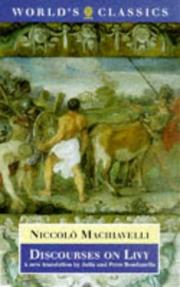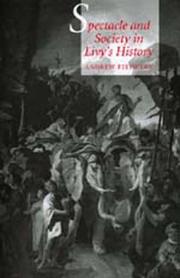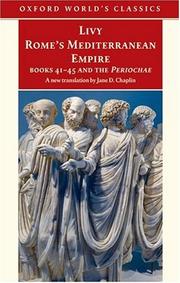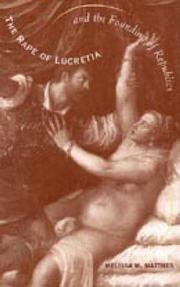| Listing 1 - 10 of 13 | << page >> |
Sort by
|
Book
ISSN: 16104188 ISBN: 9783406621888 3406621880 3406621899 2821846347 Year: 2011 Volume: Heft 140 Publisher: München: Beck,
Abstract | Keywords | Export | Availability | Bookmark
 Loading...
Loading...Choose an application
- Reference Manager
- EndNote
- RefWorks (Direct export to RefWorks)
Hauptbeschreibung Das Ziel dieser Arbeit ist ein besseres Verständnis der Kommunikation zwischen Livius und seinen Lesern über Geschichte und die Analyse der vor diesem Hintergrund zu beobachtenden literarischen Techniken. Zu diesem Zweck wird der Text hier programmatisch in seiner Gesamtheit in den Blick genommen und bei seiner Interpretation stets die Perspektive des Rezipienten einbezogen. In einem ersten Schritt wird ab urbe condita zunächst in den politischen und kulturellen Kontext seiner Entstehungszeit im 1. Jh. v. Chr. eingeordnet, die durch einen vielfachen Wandel, nicht z
Narration (Rhetoric) --- Narration --- History --- Histoire --- Livy. --- Livy --- Criticism, Textual. --- Technique. --- Technique --- Livy -- Technique. --- Livy. -- Ab urbe condita. --- Narration (Rhetoric). --- Narration. --- Languages & Literatures --- Greek & Latin Languages & Literatures --- Narrative (Rhetoric) --- Narrative writing --- Tite-Live --- Livio --- Livius, Titus --- Livius Patavinus, Titus --- Livius --- Titus Livius --- Rhetoric --- Discourse analysis, Narrative --- Narratees (Rhetoric) --- Livius, T. --- Tite-Live, --- --Histoire romaine --- --Narration --- --Livy --- Livyus, Titus --- Liviĭ, Tit --- Liwiusz, Tytus --- Livio, Tito --- ליוויוס, טיטוס --- Livy - Ab urbe condita --- Livy - Technique --- Tite-Live, 64 av JC-10 --- Erzählweise --- Ab urbe condita
Book
ISBN: 9791036555862 Year: 2020 Publisher: München C.H.Beck
Abstract | Keywords | Export | Availability | Bookmark
 Loading...
Loading...Choose an application
- Reference Manager
- EndNote
- RefWorks (Direct export to RefWorks)
Uncertainty is a fundamental part of the human condition. Experiences thwart expectations, and the world is in constant need of interpretation, evaluation and disambiguation. When writing about the past, historians can approach this uncertainty in different ways and either eliminate it from their history or enact it. This book examines the dynamics between historiography and uncertainty in the works of Livy and Velleius Paterculus. Combining close readings and theoretical reflection, it develops a distinct concept of temporal and hermeneutic uncertainty and builds on this concept to shed new light on the narrative composition of their histories. It has been argued that narrative is an essential part of human life and civilization. While engaging with recent approaches to the theory of narrative, Uncertainty in Livy and Velleius explores historiographical narrative as a mode of grappling with uncertainty. Unsicherheit ist Teil der conditio humana. Erfahrungen durchkreuzen Erwartungen, und die Lebenswelt verlangt nach Interpretation, Einordnung und der Auflösung von Mehrdeutigkeiten. Historiker können diese Unsicherheit in ihren Geschichtsbildern entweder abbilden oder eliminieren. Dieses Buch untersucht das Verhältnis zwischen Geschichtsschreibung und Unsicherheit in den Werken der römischen Historiker Livius und Velleius Paterculus. Methodisch kombiniert es literaturwissenschaftliche Analysen und theoretische Reflexion, um ein klar umrissenes Konzept von Unsicherheit zu entwickeln, das zwischen einer zeitlichen und einer hermeneutischen Dimension unterscheidet. Mit Hilfe dieses Konzepts können bisher vernachlässigte Aspekte der narrativen Form der beiden Geschichtswerke in den Blick genommen werden. Das Erzählen gilt als essentieller Teil menschlichen Zusammenlebens. In Auseinandersetzung mit aktuellen Debatten zur Erzähltheorie versteht Uncertainty in Livy and Velleius historiographisches Erzählen als eine Auseinandersetzung mit Unsicherheit.
History --- Literature (General) --- historiography --- classical philology --- temporal uncertainty --- hermeneutic uncertainty --- narrative composition --- Livy --- Velleius

ISBN: 0191587397 0585110662 9780191587399 9780585110660 0192829459 9780192829450 0192804731 9780192804730 0191604666 0199555559 Year: 1997 Publisher: Oxford ; New York : Oxford University Press,
Abstract | Keywords | Export | Availability | Bookmark
 Loading...
Loading...Choose an application
- Reference Manager
- EndNote
- RefWorks (Direct export to RefWorks)
Political science --- Political Theory of the State --- Political Science --- Law, Politics & Government --- Early works to 1800 --- Livy.

ISBN: 0520210263 0520210271 0520919696 0585160287 9780520919693 9780585160283 9780520210271 9780520210264 Year: 1998 Publisher: Berkeley, Calif : University of California Press,
Abstract | Keywords | Export | Availability | Bookmark
 Loading...
Loading...Choose an application
- Reference Manager
- EndNote
- RefWorks (Direct export to RefWorks)
Public spectacle-from the morning rituals of the Roman noble to triumphs and the shows of the Arena-formed a crucial component of the language of power in ancient Rome. The historian Livy (c. 60 B.C.E.-17 C.E.), who provides our fullest description of Rome's early history, presents his account of the growth of the Roman state itself as something to be seen-a visual monument and public spectacle. Through analysis of several episodes in Livy's History, Andrew Feldherr demonstrates the ways in which Livy uses specific visual imagery to make the reader not only an observer of certain key events in Roman history but also a participant in those events. This innovative study incorporates recent literary and cultural theory with detailed historical analysis to put an ancient text into dialogue with contemporary discussions of visual culture.In Spectacle and Society in Livy's History, Feldherr shows how Livy uses the literary representation of spectacles from the Roman past to construct a new sense of civic identity among his readers. He offers a new way of understanding how Livy's technique addressed the political and cultural needs of Roman citizens in Livy's day. In addition to renewing our understanding of Livy through modern scholarship, Feldherr provides a new assessment of the historian's aims and methods by asking what it means for the historian to make readers spectators of history.
Italy --- Regions & Countries - Europe --- History & Archaeology --- Livy --- Rome --- History --- Historiography --- Amusements --- Spectacles et divertissements --- Social aspects --- Aspect social --- Livy. --- Criticism and interpretation. --- History. --- Historiography. --- Histoire --- Historiographie --- Criticism and interpretation --- Livius Patavinus, Titus --- Livius --- Tite-Live --- Livio --- Titus Livius --- Livius, Titus --- Livius, T. --- Livyus, Titus --- Liviĭ, Tit --- Liwiusz, Tytus --- Livio, Tito --- ליוויוס, טיטוס --- Livy - Ab urbe condita --- Rome - History --- Rome - Historiography

ISBN: 0191828505 1281147001 9786611147006 1435699025 0191517844 9780191517846 9781435699021 9780191828508 6611147004 0192833405 9780192833402 9781281147004 0199556024 Year: 2007 Publisher: Oxford ; New York : Oxford University Press,
Abstract | Keywords | Export | Availability | Bookmark
 Loading...
Loading...Choose an application
- Reference Manager
- EndNote
- RefWorks (Direct export to RefWorks)
The Third Macedonian War ended the kingdom created by Philip II and Alexander the Great and was a crucial step in Rome's dominance of the Mediterranean. Livy's narrative is also a moral study of the individuals involved. This edition includes the Periochae, later summaries of Livy's original 142-book history.
Livy --- Livius, Titus --- Livius Patavinus, Titus --- Tite-Live --- Livyus, Titus --- Liviĭ, Tit --- Liwiusz, Tytus --- Livio, Tito --- Livius, T. --- Livio --- ליוויוס, טיטוס --- Rome --- History. --- Titus Livius

ISBN: 0271020547 0271020555 9780271020556 9780271020549 0271030127 0271031107 Year: 2000 Publisher: University Park (Pa.): Pennsylvania state university press,
Abstract | Keywords | Export | Availability | Bookmark
 Loading...
Loading...Choose an application
- Reference Manager
- EndNote
- RefWorks (Direct export to RefWorks)
The bonds among republican citizens are created, in part, through the stories told and retold as the foundational myths of the republic. In this book, Melissa Matthes takes advantage of the way in which republican theorists in different eras-Livy, Machiavelli, and Rousseau-retell the story of the rape of Lucretia to support their own conceptions of republicanism.The recurring presentation of this story as theater by these different theorists reveals not only the performative elements of republicanism but, as Matthes argues, adds to Hannah Arendt's emphasis on the oral dimensions of speech and hearing the important idea of public space as a visual field. Lucretia's story also helps illuminate the gendering of republicanism, particularly the aspects of violence and subordination that lie at its very origin. By focusing attention on this underlying and deeply gendered quality of republics, Matthes brings republican theory into fruitful dialogue with feminism.
Feminist theory --- Republicanism. --- Théorie féministe --- Républicanisme --- Political aspects. --- Aspect politique --- Lucretia --- Livy. --- Livy --- Machiavelli, Niccolò, --- Rousseau, Jean-Jacques, --- In literature. --- Criticism and interpretation. --- Criticism and interpretation --- Republicanism --- Republics --- Political aspects --- In literature --- Théorie féministe --- Républicanisme --- Machiavelli, Niccolò, --- Feminist theory - Political aspects --- Lucretia - In literature --- Lucretia.

ISBN: 1280444797 1423767683 9781423767688 9781280444791 0198152744 9780198152743 0198152744 138300644X Year: 2023 Publisher: Oxford : Oxford University Press,
Abstract | Keywords | Export | Availability | Bookmark
 Loading...
Loading...Choose an application
- Reference Manager
- EndNote
- RefWorks (Direct export to RefWorks)
The Roman historian Livy saw the past as a storehouse of lessons. This text examines how his historical figures manipulate the shifting meaning of the past and reveals Livy's acute sensitivity to contemporary problems.
Italy --- Regions & Countries - Europe --- History & Archaeology --- Livy. --- Livy --- Livius, Titus --- Livius Patavinus, Titus --- Tite-Live --- Livyus, Titus --- Liviĭ, Tit --- Liwiusz, Tytus --- Livio, Tito --- Livius, T. --- Livio --- ליוויוס, טיטוס --- Criticism and interpretation. --- Rome --- History. --- Historiography. --- Titus Livius --- Criticism and interpretation --- Historiography --- History

ISBN: 9060324420 9027272662 1283903180 9789060324424 9789027272669 Year: 1971 Publisher: Amsterdam : B.R. Gruner,
Abstract | Keywords | Export | Availability | Bookmark
 Loading...
Loading...Choose an application
- Reference Manager
- EndNote
- RefWorks (Direct export to RefWorks)
Die Corvinuserzählung, die wir bei Gellius finden, ist in der Forschung lange disputiert worden. H. Peter (1870) hatte sich entschlossen, sie unter die Fragmente des Claudius Quadrigarius aufzunehmen, wegen der Nachbarschaft zur Torquatuserzählung. Mcdonald (1975) vergleicht die bei Gellius gegebene Erzählung mit der livianischen (VII 26f) und betrachtet sie dabei als repräsentativ für die Vorlagen des Livius. Die Gleichheit des Gegenstandes verhilft uns dazu, den Unterschied, der sich in verschiedener Sprache anzeigt, im Dargestellten bestätigt zu finden. Als eine Vergleichung, die dem Wesen
Latin prose literature --- History and criticism --- Gellius, Aulus --- Claudius Quadrigarius, --- Criticism and interpretation --- Rome --- Historiography --- In literature --- -Latin literature --- Claudius Quadrigarius, Quintus --- -Gellius, Aulus --- Quadrigarius, Quintus Claudius --- Claudio Quadrigario, Q. --- Quadreigario, Q. Claudio --- Aulu-Gelle --- Gelio, Aulo --- Gelius, Aulius --- Historiography. --- In literature. --- -History and criticism --- Livy --- Livy. --- Gellius, Aulus. --- Criticism and interpretation. --- History and criticism. --- Latin prose literature - History and criticism --- Claudius Quadrigarius, - Criticism and interpretation --- Rome - Historiography --- Rome - In literature
Book
ISBN: 9782870379950 2870379951 2390290825 Year: 2017 Volume: 14 Publisher: Namur Presses universitaires de Namur
Abstract | Keywords | Export | Availability | Bookmark
 Loading...
Loading...Choose an application
- Reference Manager
- EndNote
- RefWorks (Direct export to RefWorks)
L'historien latin Tite-Live est l’auteur d’une monumentale Histoire romaine en 142 livres. Les parties conservées de l’œuvre furent l’une des principales sources par lesquelles l’Occident médiéval et moderne accéda au récit des premiers temps de Rome et de son expansion à l’époque républicaine. En 2017, pour commémorer le bimillénaire de la mort de cet auteur, s’est tenue à la Bibliothèque Universitaire Moretus Plantin (Université de Namur) une exposition de livres anciens qui illustrait les facettes variées de la réception de l’œuvre livienne au cours des cinq derniers siècles. Dans la quarantaine de notices de ce catalogue, le lecteur découvrira des éditions et traductions anciennes de Tite-Live, ainsi que des ouvrages qui participèrent de la redécouverte de l’Antiquité durant la Renaissance. Y sont aussi dévoilés quelques exemples – parfois surprenants – de l’influence que Tite-Live put avoir sur de grands noms de la littérature et de la pensée modernes : Érasme, Montaigne, Machiavel, Shakespeare, Corneille…
Tite-Live --- Manuscripts, Latin (Medieval and modern) --- Transmission of texts --- Literary transmission --- Manuscript transmission --- Textual transmission --- Criticism, Textual --- Editions --- Manuscripts --- Medieval and modern Latin manuscripts --- Manuscripts, Medieval --- History --- Livy. --- Livy --- Livius, Titus --- Livyus, Titus --- Liviĭ, Tit --- Liwiusz, Tytus --- Livio, Tito --- Livius, T. --- Livio --- ליוויוס, טיטוס --- Translations --- History and criticism --- Influence --- Rome --- Rim --- Roman Empire --- Roman Republic (510-30 B.C.) --- Romi (Empire) --- Byzantine Empire --- Rome (Italy) --- Historiography --- Exhibitions --- 094 LIVIUS, TITUS --- 82.085.43 --- 094 LIVIUS, TITUS Oude en merkwaardige drukken. Kostbare en zeldzame boeken. Preciosa en rariora--LIVIUS, TITUS --- Oude en merkwaardige drukken. Kostbare en zeldzame boeken. Preciosa en rariora--LIVIUS, TITUS --- 82.085.43 Literaire receptie --- Literaire receptie --- Information Science & Library Science --- historien --- Antiquité romaine --- œuvre --- incunable --- édition --- humanisme --- exposition --- patrimoine --- Book history
Book
ISBN: 2356135677 Year: 2021 Publisher: Bordeaux : Ausonius Éditions,
Abstract | Keywords | Export | Availability | Bookmark
 Loading...
Loading...Choose an application
- Reference Manager
- EndNote
- RefWorks (Direct export to RefWorks)
Cette étude explore dans une perspective comparative la présentation historique et l’interprétation philosophique de la décadence de la res publica chez Salluste et Tite‑Live. Dans la première partie, il est montré que Salluste et Tite-Live sont les premiers auteurs à avoir choisi comme thème central de leur récit le progrès et la décadence d’une cité. À travers un examen précis des étapes de la décadence chez les deux auteurs, il est remarqué que Tite‑Live apporte constamment des corrections à la théorie de Salluste. Le schéma d’aucun des deux historiens ne se conforme à une vision cyclique ou linéaire du temps. La représentation biologique de la cité montre aussi que les hommes sont les seuls responsables pour la maladie de la décadence. Or, la reprise du progrès, selon une conception cyclique et la guérison du corps de l’État sont évoquées comme perspectives seulement par Tite-Live. La deuxième partie est consacrée aux causes de la maladie de la décadence, et la troisième à la guérison de la res publica. Trois facteurs sont examinés en détail : les facteurs « divins », le metus hostilis et la nature humaine. Tite-Live renverse l’analyse de plus en plus pessimiste de Salluste, et réintroduit l’homme en tant que facteur principal de l’histoire et comme responsable de la décadence. Dans la troisième partie, leur vision différente de l’avenir de Rome est mise en lumière, à travers l’étude de la position politique et de la fonction exemplaire de l’œuvre des deux historiens. Il en ressort que Tite-Live adopte les catégories sallustéennes d’analyse, mais conçoit sa propre présentation et interprétation de la décadence en réponse à son devancier, dont il renverse les théories.
History --- Salluste --- Tite-Live --- décadence --- progrès --- historiographie romaine --- histoire romaine --- philosophie politique --- philosophie de l'histoire --- res publica --- Auguste --- Sallust, --- Livy. --- Rome --- Livy --- Livius, Titus --- Livius Patavinus, Titus --- Titus Livius --- Livyus, Titus --- Liviĭ, Tit --- Liwiusz, Tytus --- Livio, Tito --- Livius, T. --- Livio --- ליוויוס, טיטוס --- Sallust --- Sallustius, C. Crispus --- Sallustius Crispus, C. --- Sallustius Crispus, Gaius --- Sallustius Crispus, Caius --- Salustio Crispo, Cayo --- Crisp, G. Sal·lusti, --- Crispus, C. Sallustius, --- Crispus Sallustius, C., --- Gaio Crispo Sallustio, --- Gayo Salustio Crispo, --- Krisp, Gaĭ Salli︠u︡stiĭ, --- Krispus, Gajus Salustiusz, --- Salli︠u︡stiĭ Krisp, Gaĭ, --- Salluste, --- Sal·lusti, --- Sal·lusti Crisp, G., --- Sallustio Crispo, Caio, --- Sallustio, Gaio Crispo, --- Sallustius, C. Crispus, --- Sallustius Crispus, C., --- Sallustius Crispus, Gaius, --- Salustio, --- Salustiusz Krispus, Gajus, --- סאלוסט, --- גאיוס סאלוסטיוס קריספוס --- Europe
| Listing 1 - 10 of 13 | << page >> |
Sort by
|

 Search
Search Feedback
Feedback About UniCat
About UniCat  Help
Help News
News